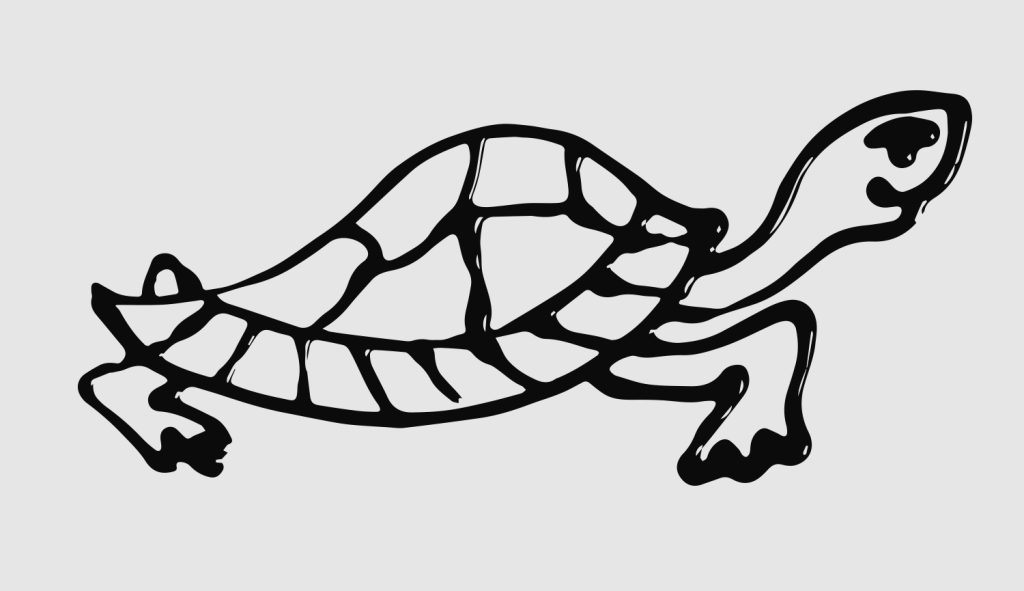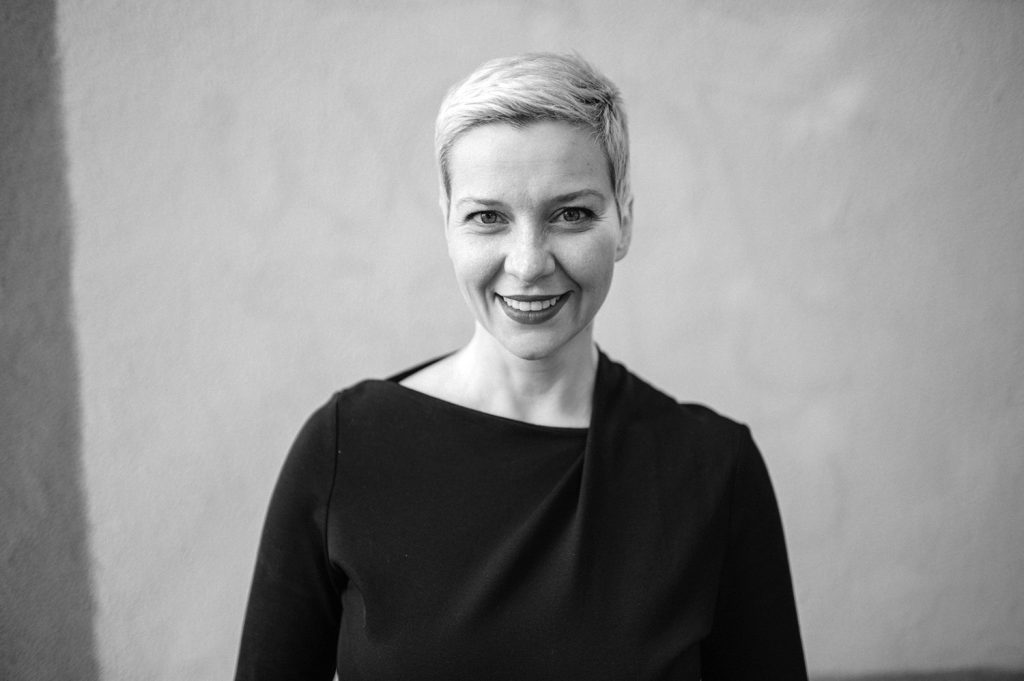Maria Alexandrovna Kalesnikova (belarusisch: Марыя Аляксандраўна Калеснікава, russisch: Мария Александровна Колесникова / Marija Alexandrowna Kolesnikowa; von ihr selbst benutzte Transkription: Maria Kalesnikava) ist Musikerin, Lehrerin und politische Aktivistin sowie Koordinatorin des Stabes von Viktor Babariko bei den Präsidentschaftswahlen in der Republik Belarus in 2020. Also, she is a representative of the joint staff of Svetlana Tikhanovskaya and a member of the Presidium of the Coordinating Council for the organization of the process of overcoming the political crisis, leader of the party “Vmeste” and political prisoners. On September 11, 2020, Amnesty International recognized Maria Kolesnikova as a political prisoner.
Maria Kolesnikova was born on April 24, 1982 in Minsk, Belarusian SSR. Even as a child, she began to be intensively involved with music and to develop as a musician. At the age of 17 she began to work – she taught flute in Minsk at middle school No. 192 and gymnasium No. 4. Maria approached her work very responsibly, was kind to children and was greatly appreciated by her students and parents loved. During her studies she also played in the National Academic Concert Orchestra and the Presidential Orchestra of the Republic of Belarus.
From 2002 to 2008, Maria took part in the charity project “Houses instead of Chernobyl”, where musicians from Belarus gave concerts in Germany to raise funds for Belarusian families affected by the Chernobyl disaster. In 2007, Maria graduated from the Belarusian State Academy of Music with a diploma in flute and conducting. In the same year, Maria moved to Germany to learn to play the transverse flute and studied at the HMDK Stuttgart in the early music and contemporary music courses, which she completed with the two titles Master Early Music and Master New Music.
From 2007 to 2020 Maria lived in Germany. During this time she regularly came to Belarus to organize artistic projects.
The 2010s were marked by active concert activities and the organization of international cultural projects in Germany and Belarus. One of the first projects in Belarus was a series of lectures entitled “Music Lessons for Adults”, which Maria independently developed and organized in one of the Minsk cultural centers. These courses were very popular and inspired many adults to learn more about music.
In 2017, Maria was one of the founders of the creative association Artemp, which held cultural events in the field of contemporary art in Minsk, e.g. B. A composers’ academy for students of the Belarusian State Academy of Music with the participation of famous composers from Germany.
Also in 2017, Maria was a speaker at the TEDx conference in Minsk, where she spoke about the importance of interaction between people, the ability to listen to one another, and the relationship between changes in society and music. From 2017, she joined as a member of the Trios Vis-a-vis (Germany) on.
In 2018, Maria became a co-founder of the cultural association InterAKT Initiative (Germany). She was also on the board of the Stuttgart collective for contemporary music (S-K-A-M e.V.).
For Maria, the core values have always been freedom of expression, freedom of speech, freedom of choice. This was reflected in the projects in which she participated.
One of these projects was “NoBody NoVoice”, where Maria spoke about the fact that freedom is everyone’s choice and responsibility, and that choosing to be free is always more difficult than accepting everything “as is it is”.
youtube
In 2019, Maria became the artistic director of the Minsk cultural center OK16. During her work at OK16, projects unique for Belarus were carried out in this place, such as the large-scale art festival “Mythologemes of the Millennium” by the world-famous artist Alexander Rodin.
POLITICAL CAREER
During the 2020 Belarus presidential election campaign, Maria joined the staff of presidential candidate Viktor Babariko and became the headquarters coordinator.
On July 16, the heads of the headquarters of Viktor Babariko (Maria Kolesnikova) and Valeria Tsepkala (Veronika Tsepkala) announced their merger with the headquarters of Svetlana Tikhanovskaya, who was registered as a presidential candidate. The merger was based on the following principles: voters were asked not to boycott the elections but to go to the polls; in the remaining time before the election, the team provided information on how to protect your vote from forgery. The headquarters also called for participation in campaigns for fair elections and suggested becoming observers to monitor voter turnout and the transparency of vote counting. After Svetlana Tikhanovskaya’s victory, the joint team sought the release of all political and economic detainees and gave them the right to have their cases reviewed. The central principle was the holding of new presidential elections in which all alternative candidates could participate.
On the evening of August 8, the day before the elections, Maria Kolesnikova was arrested by the police but released minutes later. The reason given was that she had been “mistaken” for someone else.
On August 18, Maria Kolesnikova was elected to the main body of the “Coordinating Council for the organization of the process of overcoming the political crisis”, and on August 19 she was elected to its presidency.
On August 31, Maria announced the creation of the political party “Vmeste”, created on the initiative of the headquarters of Viktar Babaryka.
PROSECUTION
On September 7, 2020, Maria Kolesnikova was kidnapped by unknown persons in the center of Minsk. They tried to deport her to Ukraine. The State Border Committee of the Republic of Belarus informed that the members of the Coordination Council Maria Kolesnikova, Ivan Kravtsov and Anton Rodnenkov crossed the border with Ukraine around four in the morning. In Maria’s case, the expulsion failed because she tore up her passport herself. On September 8, 2020, she was arrested again.
On September 9, Kolesnikova’s father informed that she had been arrested and was being held as a suspect in a criminal case in Minsk’s pre-trial detention center No. 1 on Volodarsky Street. On September 12, she was transferred from the Minsk pre-trial detention center to a temporary detention center in the city of Zhodino.
On September 16, the Investigative Committee of the Republic of Belarus filed charges against Maria Kolesnikova under Part 3 of Article 361 of the Criminal Code of the Republic of Belarus (prompting acts aimed at damaging national security and committed through the media and the Internet). , which carries a penalty of two to five years in prison. On January 6, it became known that his stay in the pre-trial detention center had been extended until March 8. On January 8, 2021, Maria was transferred from a prison in Zhodino to SIZO-1 in Minsk.
In February 2021, Maria Kolesnikova was charged with incitement to acts against national security, conspiracy to unconstitutionally seize state power and forming an extremist group, for which she faced up to 12 years in prison.
On September 6, political prisoner Maria Kolesnikova was sentenced in the Minsk District Court building after a month-long hearing of the criminal case. Judge Sergei Epikhov found them guilty under three articles of the Criminal Code: Part 3 of Art. 361 (incitement to acts contrary to national security), Part 1 of Art. 357 (conspiracy to seize state power by unconstitutional means) and Part 1 of Art 361-1 (founding and leading an extremist group) and sentenced her to 11 years in prison. Maria was sentenced to imprisonment in a labor camp.
On December 24, 2021, the Supreme Court considered the appeal and upheld the verdict against Maria Kolesnikova. On January 11, 2022, Maria was transferred to IK No. 4 in Gomel.
On November 19, 2020, US Ambassador to the Organization for Security and Cooperation in Europe Jim Gilmour issued a statement calling for the immediate release of Maria Kolesnikova as an “important step towards national dialogue”.
During her time in prison, Maria Kolesnikova received numerous awards in the field of civil society development and human rights protection.


